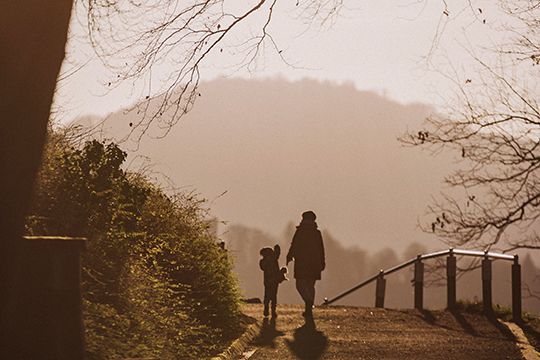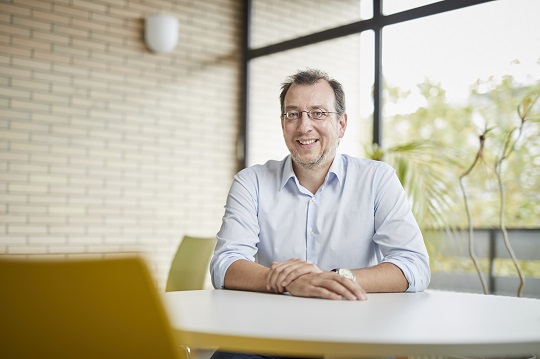Recharging During the Dark Season
Freiburg, Dec 21, 2020
No mulled wine at the Christmas market, convivial Christmas parties, concerts, or theater performances – this winter is shaping up to be something of its very own. The corona pandemic has left us bereft of many small comforts. After the summertime ease that followed the first lockdown, the current situation could become twice the burden than what's gone before. The holiday and year end rush will unfold in the dark and cold as always, but in 2020, they're taking place in tandem with the pandemic and its limitations. How can people cope and emerge unscathed? Anita Rüffer spoke with the psychological psychotherapists Prof. Dr. Markus Heinrichs and Dr. Tobias Stächele about possible coping strategies. The two men lead the Outpatient Psychotherapy Clinic and Research Unit for Stress-Related Disorders at the University of Freiburg. Recently the experts published a Guidebook that provides scientifically proven tips for stress management.

That raises the spirits: Light and activity out in the fresh air stimulates the hormones melatonin and serotonin. Photo: Sandra Meyndt
Mr. Heinrichs, have you ascertained increased incidences of stress-related illnesses and depression these days?
Markus Heinrichs: People aren't built for social distancing. All of us are missing contact and the lack of it can lead to symptoms, but these do not entail mental illness per se. It's different with people who were already feeling very socially isolated before lockdown or have preexisting mental health issues. They could have intensified depression or anxiety disorders. Yet we haven't observed more people seeking counseling at our clinic these days than there would be otherwise. That being said, there are always seasonal fluctuations during the dark time of year.
Daily life was just beginning to get back to a bit of routine after the first lockdown. And now? There's no choir, or sports, and we're being sent back to our home offices. Is there lethargy lurking in the home?
Tobias Stächele: When there's no longer a daily routine that's shaped externally, by work for example, then it's important to give yourself some sort of structure. You should be getting up at the same time, stopping work at the same time, taking breaks now and then, getting a bit of fresh air, going for walks, and preparing meals. These daily rhythms help to protect us from lethargy, but also from becoming overwhelmed. For example, when daily routines are lost due to excess stress, then our patients have to learn that they need to do things like this to get themselves off the hamster-wheel of work. The patients need to check their settings and practice self-care in that they learn to distance themselves from their work. That's how they experiment with ways to get a toehold on establishing self-determined structures. It's possible to do that, even in the conditions of this winter. For parents working at home who have to care for their children at the same time because of a selective quarantine, that causes maximum stress. Clear agreements and procedures are basic for coping with this.
 Routines reduce stress, says Tobias Stächele: "Always get up and stop working at set times. Take breaks, go out for air, walk around the block, or cook a meal." Photo: Sebastian Heck
Routines reduce stress, says Tobias Stächele: "Always get up and stop working at set times. Take breaks, go out for air, walk around the block, or cook a meal." Photo: Sebastian Heck
So you work with your patients on changing their positions and attitudes. Can the corona crisis actually somehow result in something positive then, without dressing up the pandemic too excessively?
Markus Heinrichs: In a recent study we even found that during lockdown people's awareness and sense of responsibility for climate conservation and environmental issues grew significantly in comparison to beforehand. Originally it wasn't a study designed around the pandemic, which would've been aimed at examining the correlation between COVID-19 and people's attitudes. But when the lockdown "intervened" we took advantage of the timing and surveyed participants briefly again at the end of the lockdown in spring. Yet we also observed that in this phase, different mental and physical symptoms increased, as did prejudice against refugees.
Based on that, then crises and stressful situations can produce negative as well as positive impacts.
Tobias Stächele: We define stress in general as a reaction to internal and external demands. Acute stress activates energy that allows a person to master a threatening or challenging situation. When that works, stress can be a healthy mechanism that helps to ensure survival, positive individual development, and active shaping of a person's world. And currently, it's not forbidden for anyone to walk in the woods alone or in twos, or to finally work on their tax return, or go back to a neglected hobby, or perhaps rediscover a musical instrument. Contacts can be maintained even under the current circumstances. You just have to pick up the telephone or use one of the other, many communication technologies. Even old-fashioned letter writing could be an option.
Nevertheless, nobody is daring to predict how long all this is going to last. That produces uncertainties and anxieties about job or income loss, and also fears of catching the virus. Aren't dark days and a dim outlook a bit too much of the negative for human mental health?
Markus Heinrichs: We need to take seriously that uncertainty is ongoing together with a depressed autumn mood caused by changing levels of light and less time moving around outside. November and December are often difficult months for people who are prone to depression anyway. Add to that the pandemic and its requirements on distancing, and it gets to be too much. There are a set of methods to counter that, however. You need to become more physically active rather than withdrawing. And you can do it without going to the gym, too. Plus, pay attention to good nutrition rather than eating lots of carbohydrates and gaining weight. Be caring towards yourself and others. And then, to be really practical, soak up some daylight outdoors at lunch time or even try to do it with a natural daylight lamp that produces at least four thousand lumens. That brings the body's melatonin and serotonin levels into a more balanced rhythm. Even just half-an-hour of regular "light therapy" in the morning can have a positive effect on mood.

Uplifting light: Markus Heinrichs recommends taking a walk around midday or using a daylight lamp regularly in the morning. Photo: Jürgen Gocke
Do we need to be more concerned about old or young people?
Tobias Stächele: It has less to do with age than a person's circumstances. Of course older people are in a risk group, and have ostensibly more anxiety about catching the virus. But people who had a stable, well-structured daily life and a viable social network before the pandemic are less at risk than someone who already was lonely or felt isolated beforehand. That's true of young and old people alike.
Are other members of the university community seeking your advice as well? The challenges caused by the pandemic could be overwhelming for some.
Markus Heinrichs: Of course our clinic is open to everyone in the university community. I estimate that these days everyone is working as hard as they can to keep studying, teaching and research running smoothly at the university under adverse conditions. They're trying to prevent overloads. All the students at our university have been assured that no course of study will be extended unnecessarily. Instructors have implemented online courses successfully in no time at all. We too, are managing to continue our diagnosing of stress in the conditions set by the corona pandemic, although this requires significantly more work for our team. But we've learned a great deal as we've done it, and taken on more of a sporting attitude that we will definitely master this together.

